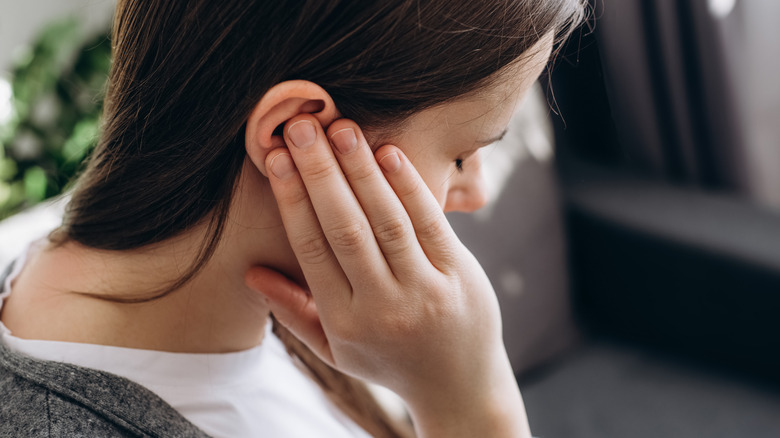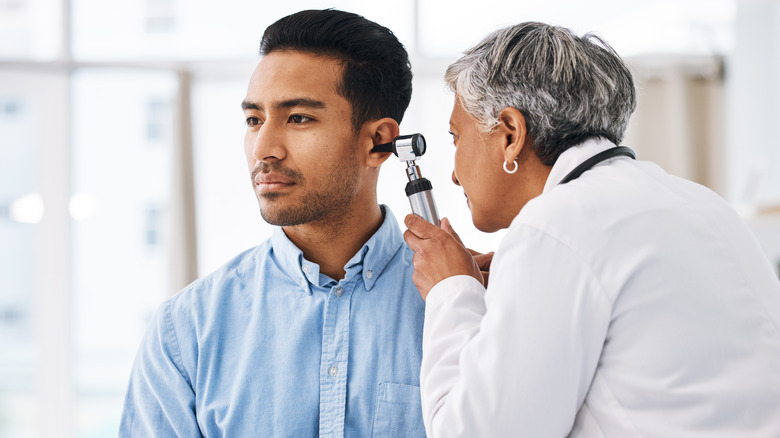What It Means When Your Ears Ring After Having Sex
When we have sex a lot of things happen to our body. Blood rushes to our genitals, our heart starts racing, our breathing quickens, our muscles contract, we sometimes sweat in places that don't usually sweat (sweaty shins, anyone?), and as we get closer and closer to climax, things become blurry, like you're in delightful fog where there's no place for worry or concern. It's in that delicious moment of pure ecstasy laden with oxytocin, as things build and build, that only one thing matters: orgasm. Then it happens, you breathe a sigh, indulge in some proper sexual aftercare and all is right with the world — sometimes.
While there's mostly just bliss that follows orgasm, for some people there's something else: loss of hearing or tinnitus (ringing in your ears). It doesn't last long, but the fact that it happens in the first place can be unnerving. However, to put your mind at ease, as momentarily panic-inducing as the experience may be, it's not uncommon and you're certainly not the first one for it to ever happen to (nor will you be the last).
Unfortunately, as much as there's research on tinnitus and orgasms, there's little, if any research on the two coinciding. In other words, at this point, what we have to explain this phenomenon are theories. But the theories out there, when you really think about them, make a lot of sense.
Why your ears might ring after sex
For those who have experienced hearing loss or ringing in their ears due to an orgasm — and it can happen to anyone — it usually occurs during what's called the "resolution" phase of sex. With an orgasm, our body is taken to extreme heights and now everything is falling back into place — breathing settles, heartbeats decrease, and the tension in the muscles starts to dissipate. It's this major shift in the body that could be the reason.
"[T]he sudden reduction in heart rate and blood pressure results in sudden pressure changes in the middle ear and reduction of blood flow to the inner ear," Dr. Eric Levi — an ear, nose, and throat surgeon — told Vice. "The middle ear is a finely tuned piece of engineering." Because the middle ear is a perfect work of art, so to speak, such changes in pressure can manipulate "the acoustic properties of sound transmission through the eardrum and hearing bones," said Levi. But it also may have to do with blood flow. As the blood within the ears reduces after orgasm, so do the nutrients necessary for it to function properly, therefore interrupting the signals between the ear and brain.
Levi's second hypothesis has to do with the hormones at play during sex and how parts of the brain deactivate during orgasm — those parts being the prefrontal cortex and temporal lobe. While the former is in charge of decision-making, the latter is the main hub of senses, hearing, of course, included. Therefore, Levi suggests it's the impact of the orgasm on the brain that can create a shift in regular auditory perception.
What you can do if your ears ring after sex
Well, you can stop having sex, give up masturbation, or whatever other sexual acts that bring you to orgasm. Or you can not sweat it and just accept that occasionally after an orgasm, you're going to struggle to hear for a few minutes and that's more than okay. You can also consider yourself lucky because experiencing brief tinnitus after having an orgasm is small potatoes compared to seeing colors and tasting and smelling things that don't exist. That condition is called orgasm synesthesia and according to a 2022 study published in the Iranian Journal of Psychiatry, 4% of the population have it.
"In most cases, temporary hearing changes after orgasms are not dangerous and tend to resolve on their own," National Health Service-trained audiologist Peter Byrom told Giddy. "Permanent hearing damage as a direct result of sex is extremely rare, and consensual sexual activity is not known to cause permanent hearing impairment." Naturally, if you're concerned or the ringing or silence persists, it's always a good idea to make an appointment to see your doctor.


